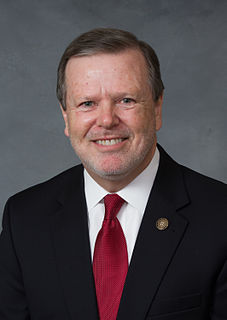Related Research Articles

Michael Francis Easley is an American lawyer and politician who served as the 72nd governor of the U.S. state of North Carolina from January 2001 to January 2009. He is the first governor of North Carolina to have been convicted of a felony related to one campaign finance violation. Subsequently, the Senior Resident Superior Court Judge for Wake County granted Easley a Certificate of Relief related to the case. A member of the Democratic Party, Easley was North Carolina's second Catholic governor.
Meg Scott Phipps is an American former politician who served as the Commissioner of Agriculture for the state of North Carolina from 2001 to 2003.

James Boyce Black is a member of the North Carolina Democratic Party, and a former member of the North Carolina General Assembly, who represented the state's 100th House district, including constituents in Mecklenburg County. An optometrist from Matthews, North Carolina, Black was elected to 11 (non-consecutive) terms in the House of Representatives, and served as Speaker of the House from January 1999 through the end of 2006, when scandal forced him to give up the leadership post. For the 2003-2004 legislative session Black was elected to serve as "Co-Speaker" with Republican Richard T. Morgan serving as the other Co-Speaker. He is tied with Liston B. Ramsey as longest-serving Speaker in state history.

Philip Edward Berger is a Republican member of the North Carolina General Assembly representing the state's thirtieth Senate district, which includes Caswell, Rockingham, Stokes, and Surry counties.

Roy Asberry Cooper III is an American attorney and politician serving as the 75th governor of North Carolina since 2017. A member of the Democratic Party, he served as the 49th attorney general of North Carolina from 2001 to 2016. He also served in the North Carolina General Assembly in both the House of Representatives (1987–1991) and Senate (1991–2001).
J. Douglas McCullough is an American lawyer and former judge of the North Carolina Court of Appeals. McCullough retired in 2017.

Several judges of the North Carolina Supreme Court and the North Carolina Court of Appeals, the state's two appellate courts, were elected on November 2, 2004. The U.S. Presidential election, 2004, U.S. House election, 2004, U.S. Senate election, 2004, North Carolina Council of State election, 2004 and North Carolina General Assembly election, 2004 were held on the same day.
Michael Byron Nifong is an American former North Carolina attorney, who has been disbarred. He served as the district attorney for Durham County, North Carolina until he was removed, disbarred and jailed following court findings concerning his conduct in the Duke lacrosse case, primarily his conspiring with the DNA lab director to withhold exculpatory DNA evidence that could have acquitted the defendants.
Crystal Gail Mangum is a former exotic dancer and convicted murderer from Durham, North Carolina, who is best known for having made false allegations of rape against lacrosse players in the 2006 Duke lacrosse case. The fact that Mangum was a black woman working in the sex industry, while the accused were all white men, created extensive media interest and academic debate about race, class, gender and the politicization of the justice system.

One justice of the North Carolina Supreme Court and six judges of the North Carolina Court of Appeals were elected to eight-year terms by North Carolina voters on November 4, 2008. This coincided with the presidential, U.S. Senate, U.S. House, gubernatorial, and Council of State elections.
Samuel James Ervin IV is a North Carolina lawyer and jurist who has served on the North Carolina Supreme Court since January 1, 2015. He previously served as a state Utilities Commissioner and as a judge of the North Carolina Court of Appeals. He is the grandson of U.S. Sen. Sam Ervin and the son of Judge Sam Ervin III.

Robert Neal "Bob" Hunter, Jr. is a North Carolina lawyer and retired jurist formerly serving on the North Carolina Court of Appeals and on the North Carolina Supreme Court.

One justice of the North Carolina Supreme Court and three judges of the North Carolina Court of Appeals were elected by North Carolina voters on November 6, 2012, concurrently with the elections for Governor and other offices. North Carolina judicial elections are non-partisan. Terms for seats on each court are eight years. In three of the four races, incumbents were re-elected to their seats, but incumbent Court of Appeals Judge Cressie Thigpen was defeated by Chris Dillon.

The 2014 United States House of Representatives elections in North Carolina were held on Tuesday, November 4, 2014 to elect the 13 U.S. Representatives from the state of North Carolina, one from each of the state's 13 congressional districts. The elections coincided with other elections to the United States Senate and House of Representatives and various state and local elections, including an election to the U.S. Senate.

Four justices of the seven-member North Carolina Supreme Court and four judges of the 15-member North Carolina Court of Appeals were elected by North Carolina voters on November 4, 2014, concurrently with other state elections. Terms for seats on each court are eight years.
Lucy Noble Inman is a judge of the North Carolina Court of Appeals and formerly served as a special North Carolina Superior Court judge. Inman won election to the appellate court in a statewide race on November 4, 2014.

One justice of the seven-member North Carolina Supreme Court and five judges of the 15-member North Carolina Court of Appeals were elected by North Carolina voters on November 8, 2016, concurrently with other state elections. Terms for seats on each court are eight years.

One justice of the seven-member North Carolina Supreme Court and three judges of the 15-member North Carolina Court of Appeals were elected by North Carolina voters on November 6, 2018, concurrently with other state elections. Terms for seats on each court are eight years. These elections were partisan for the first time since the elections of 2002. A law passed by the North Carolina General Assembly in 2017 cancelled primary elections for judicial elections in 2018 only, meaning that an unlimited number of candidates from any party could run in the general election.

Two justices of the seven-member North Carolina Supreme Court and four judges of the fifteen-member North Carolina Court of Appeals will be elected by North Carolina voters on November 8, 2022, concurrently with other state elections. Terms for seats on each court are eight years. These elections will be conducted on a partisan basis.
References
- ↑ Rawlings, Russell (2010-06-25). New NCBA Board Members, Vice Presidents Elected. ncbar.org
- ↑ Tyson trails in bid to retain seat on Court of Appeals. journalnow.com (2008-05-06). Retrieved on 2012-08-29.
- ↑ AP: GOP maintains edge on Supreme Court Archived 2017-04-25 at the Wayback Machine
- ↑ Blythe, Anne. (2012-02-28) News & Observer: SBI probes judge's actions Archived March 1, 2012, at the Wayback Machine . Newsobserver.com. Retrieved on 2012-08-29.
- ↑ Blythe, Anne. (2012-05-19) News & Observer: Wake district court judge resigns Archived May 20, 2012, at the Wayback Machine . Newsobserver.com. Retrieved on 2012-08-29.
- ↑ Ex-Wake judge, attorney charged with altering records in DWI cases. WRAL (2012-06-26). Retrieved on 2012-08-29.
- ↑ Iwabu, Takaaki (2012-07-30). "Former Wake Judge pleads guilty on altered DWI cases". newsobserver.com. Archived from the original on 2012-08-01.